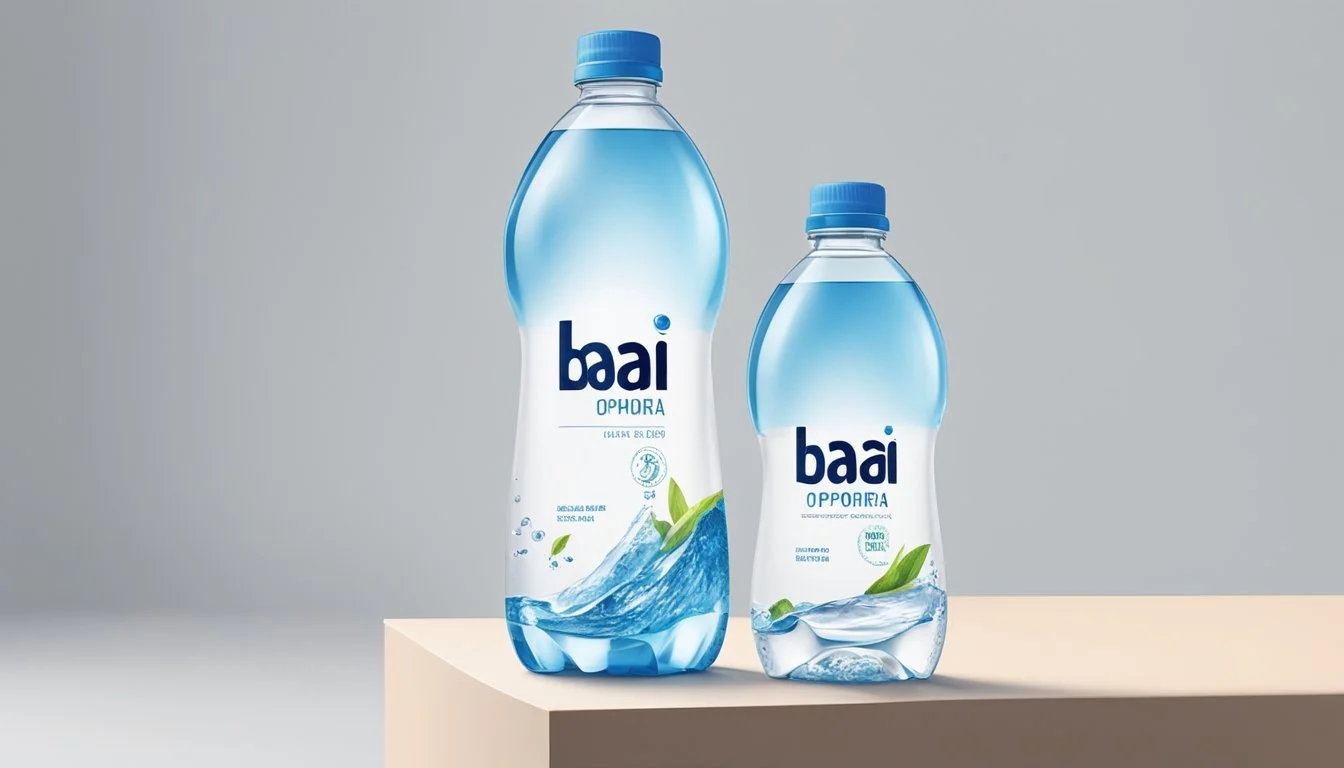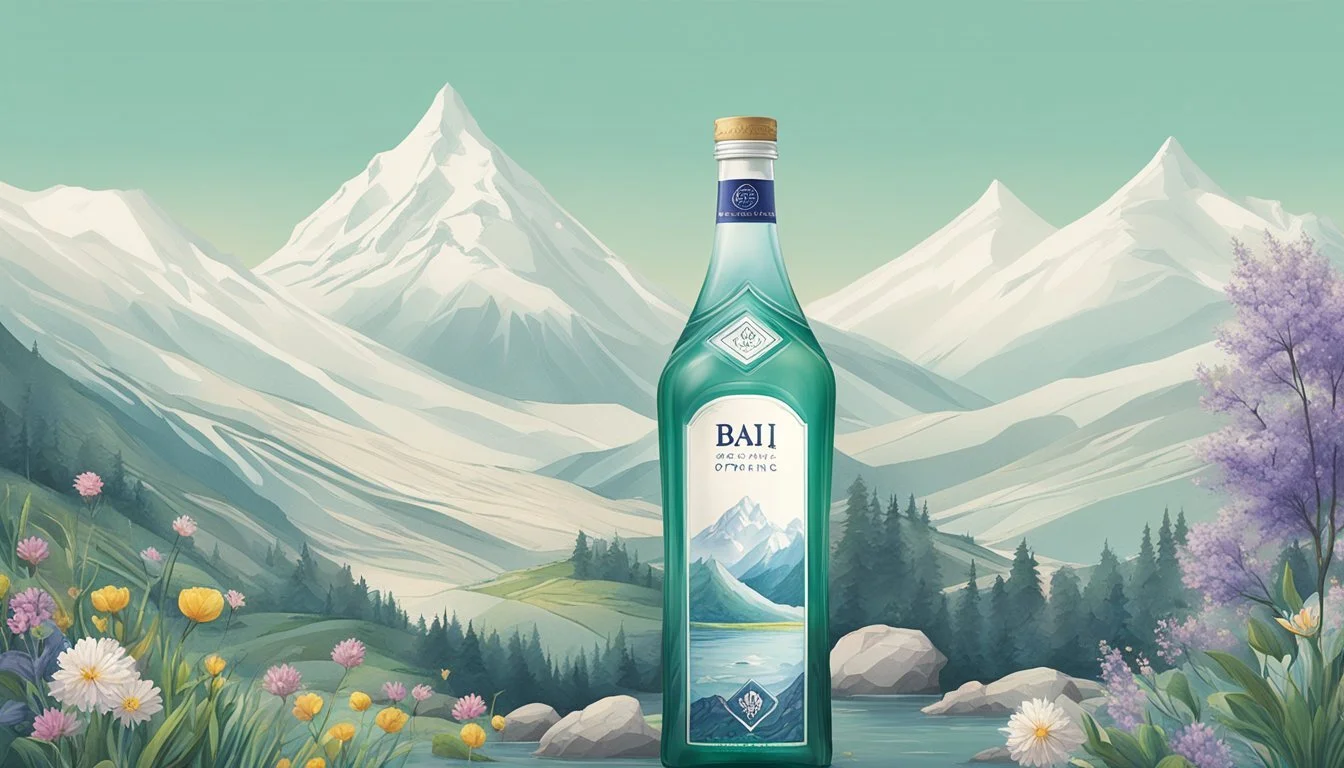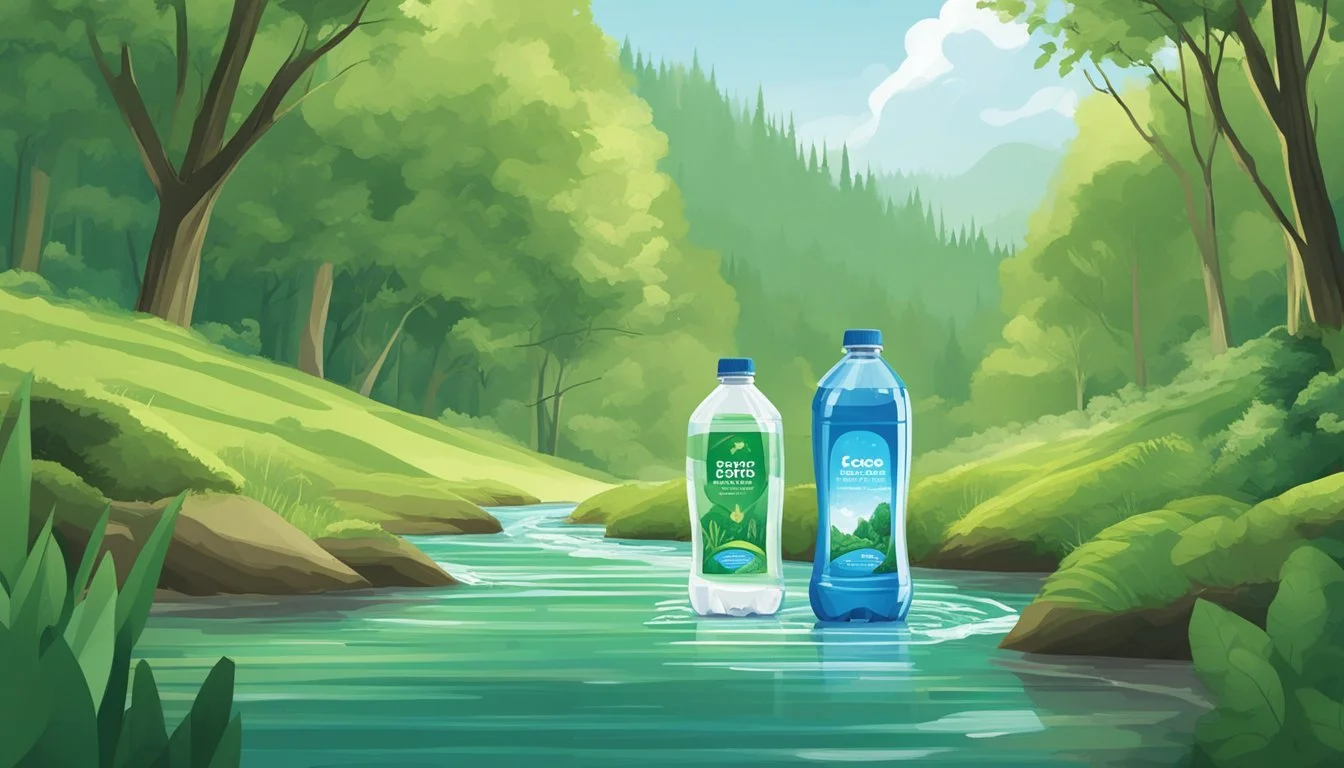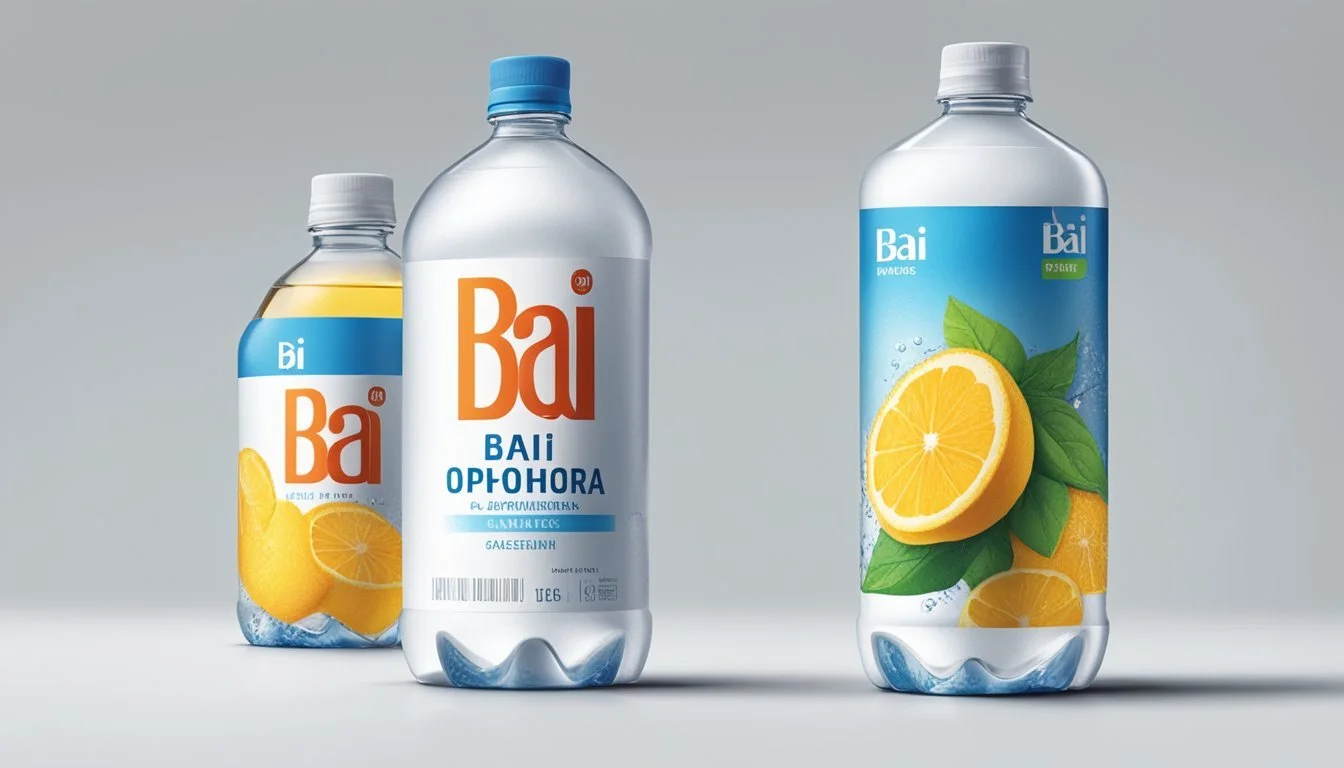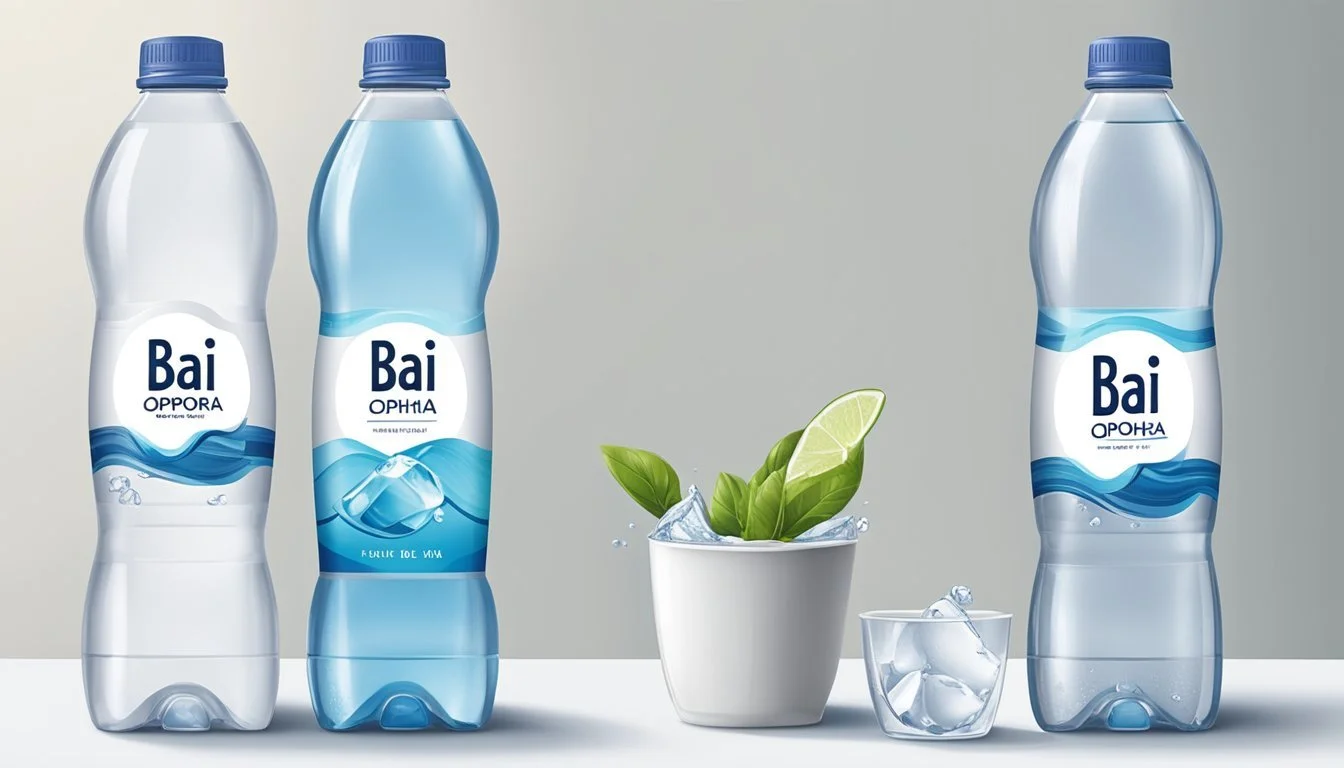Bai vs. Ophora
Comprehensive Comparison of Bottled Waters
When choosing between Bai and Ophora bottled water, it's essential to consider the unique benefits each brand offers. Bai Water stands out with its low-calorie content and the inclusion of antioxidants from coffee fruit extract, which can contribute to overall health. Additionally, Bai provides a variety of flavored options, each containing only 1 gram of sugar.
On the other hand, Ophora water is often praised for its high-quality purification process and the infusion of oxygen, aiming to promote better hydration and cellular health. This premium brand focuses on delivering water that is not only pure but also enriched with additional health benefits.
For those who prioritize antioxidant content and flavor variety, Bai might be the better choice. In contrast, if enhanced hydration and purity are more critical, then Ophora could be more suitable. By comparing these factors, consumers can make a more informed decision that aligns with their health goals and taste preferences.
Understanding Bottled Water
Bottled water has developed significantly over the years, with various types and features catering to different consumer needs. These categories range from natural spring water to flavored and sparkling varieties.
The Evolution of Bottled Water
Bottled water consumption has surged since the 1970s, driven by growing health awareness and convenience. Initially, the market was dominated by simple mineral and spring waters. Over time, the introduction of purified waters, which undergo extensive filtration to remove impurities, expanded the selection.
Advances in technology have enabled the enhancement of water with minerals and electrolytes, offering added health benefits. Additionally, Bottled water offers more exotic varieties like alkaline and antioxidant waters to appeal to health-conscious individuals.
Categories of Bottled Water
Spring Water: This type comes from underground formations and flows naturally to the surface. It retains its mineral content and is often marketed for its purity and taste.
Purified Water: Purified water undergoes processes such as distillation, deionization, or reverse osmosis to remove contaminants. It's preferred for its consistency and lack of impurities.
Sparkling Water: Known for its effervescence, sparkling water can come naturally carbonated from springs or be artificially infused with carbon dioxide.
Flavored Water: This variety has added natural or artificial flavors, making hydration more enjoyable. They often contain low or no calories and sugars.
Mineral Water: Contains specific minerals that must be present in the water as it comes from its source. They are marketed for their potential health advantages.
Each category caters to different preferences, ensuring consumers can select water that best fits their lifestyle and taste.
Brand Origins and Philosophy
Bai, renowned for its antioxidant-infused beverages, emphasizes health and natural flavors. Ophora focuses on purity and sustainability, offering naturally sourced water with environmental benefits.
Bai: The Antioxidant Infusion Pioneer
Bai originated in 2009 when founder Ben Weiss sought to create a healthy beverage alternative using coffee fruit. The brand's core philosophy centers around antioxidant infusion and natural flavors, making it stand out in the market.
Bai's beverages are marketed as "antioxidant infusions." They incorporate natural sweeteners, lack artificial preservatives, and use minimal calories per bottle. This aligns with their vision of providing refreshing, health-conscious drinks.
The company promotes the idea of making healthy choices without sacrificing taste. Bai’s strategic use of coffee fruit sets it apart, ensuring a unique product proposition that appeals to health-aware consumers.
Ophora: Purity and Sustainability at the Core
Ophora's brand philosophy revolves around purity and sustainability, emphasizing natural sourcing. The company is dedicated to providing ultra-pure water, often enhanced with oxygen and trace minerals, which sets it apart in the crowded market.
Their commitment to the environment is evident in every aspect of their business model. Aligning with eco-friendly practices, Ophora sources water sustainably. They utilize advanced filtration technologies to maintain the highest purity levels, ensuring customers receive clean, healthy water.
Ophora also prioritizes minimal environmental impact, from sourcing to packaging, fostering a holistic approach to sustainability. The company's focus on purity and ecological responsibility appeals to environmentally conscious consumers seeking high-quality hydration solutions.
Product Offerings
Bai and Ophora both offer unique bottled water products, each with distinct benefits. Bai focuses on flavored, antioxidant-rich waters, while Ophora emphasizes health-boosting properties.
Variety and Innovations by Bai
Bai offers a diverse range of flavored waters, infused with antioxidants. These flavors include Kula Watermelon, Brasilia Blueberry, and Costa Rica Clementine. Each bottle contains natural sweeteners and minimal calories.
The company also produces Bai Antioxidant Water, which includes added selenium. This product maintains a pH of 7.5 or higher, providing a balanced alkaline option.
Bai’s commitment to innovation is clear. They continuously enhance their product line with new flavors and health-focused ingredients, providing consumers with both variety and wellness benefits.
Ophora's Commitment to Health and Wellness
Ophora’s bottled water emphasizes health and wellness. Their products undergo advanced purification processes, such as oxygen infusion and mineral enrichment. This results in water that not only hydrates but may also support enhanced cellular function.
Unlike Bai, Ophora focuses on unflavored water. Their offerings include Purified Oxygenated Water and Structured Alkaline Water. Ophora prioritizes purity and nutrient content, ensuring their water supports optimal health.
Ophora’s commitment to quality is evident. They employ cutting-edge technology to create water that meets high health and wellness standards. This approach appeals particularly to health-conscious consumers.
Nutritional Value and Ingredients
Bai and Ophora offer different benefits with distinct ingredients and nutritional profiles, catering to varied health needs and preferences.
Analyzing Bai's Ingredients and Nutritional Profile
Bai's beverages are marketed as low-calorie, antioxidant-infused drinks. Each bottle typically contains just 10 calories and 1 gram of sugar, making it a good option for those watching their caloric intake. Here is a breakdown of the primary components and benefits:
Antioxidants: Primarily derived from coffee fruit and tea extracts, antioxidants in Bai help neutralize harmful free radicals.
Vitamins: Bai includes vitamin C, known for its immune-boosting properties.
Sweeteners: Uses natural sources like erythritol and stevia leaf extract, which provide sweetness without additional calories or sugar spikes.
Other Ingredients: Gluten-free and vegan-friendly, making it suitable for individuals with specific dietary restrictions.
Ophora's Ingredients and Health Contributions
Ophora focuses on delivering premium hydration with its unique ingredients. These bottled waters are designed for those seeking functional and health-boosting benefits:
Electrolytes: Enhanced with natural electrolytes, Ophora water supports hydration and recovery, especially beneficial for athletes.
Oxygen: Infused with high levels of stabilized oxygen, promoting increased stamina and detoxification.
Minerals: Includes trace minerals essential for various physiological functions.
Zero Calories and Sweeteners: Ophora water contains no calories or added sweeteners, making it an excellent choice for a pure, health-centric beverage option.
Bai and Ophora each present a unique nutritional profile, offering options that range from flavorful, antioxidant-rich drinks to purified, functional hydration solutions.
Environmental and Social Responsibility
Both Bai and Ophora play significant roles in their environmental and social responsibilities, with unique approaches to sustainability and stewardship.
Bai's Approach to Sustainability
Bai Water emphasizes sustainability in several areas. The brand uses plastic bottles, which are a notable concern due to their environmental impact. Nonetheless, Bai is committed to improving this by using recyclable materials for their packaging. They advocate for reducing plastic waste and increasing recycling rates.
In addition to packaging, Bai incorporates local sourcing for ingredients when possible, which helps to minimize their carbon footprint. However, the production process still presents challenges, especially related to the manufacturing and disposal of plastic bottles. Bai also considers the overall environmental impact of their distribution network, striving for efficiency to reduce emissions.
Ophora's Environmental Stewardship
Ophora demonstrates strong environmental stewardship principles in its operations. They focus on the sustainability of their products, using eco-friendly materials and packaging. Ophora's bottles are made from glass, which is 100% recyclable and has a lesser environmental impact compared to plastic.
Moreover, Ophora prioritizes environmental impact by employing local sourcing practices to reduce transportation emissions. The company also supports initiatives aimed at conserving water and promoting sustainability within the communities they serve. Ophora's commitment to protecting natural resources forms a core part of their business philosophy, ensuring that their practices benefit both the environment and society.
Taste and Flavor Assessments
Bai offers a unique flavored water experience with antioxidant infusions, while Ophora focuses on pure, natural water taste enhanced by its oxygen-enrichment process. Both products cater to different taste preferences and health benefits.
Flavor Profiles of Bai
Bai stands out with its bold and distinct flavors, often infused with coffee fruit. These waters are infused with natural flavors and sweetened with a mix of fruit concentrates. Popular flavors include blueberry, cherry, and watermelon. Each flavor aims to provide a refreshing, low-calorie option with an intriguing taste meant to appeal to health-conscious consumers.
Blueberry flavor features a balanced sweetness with a hint of tartness. Cherry flavor offers a rich, deep sweetness that can satisfy those who prefer a more intense fruit taste. Watermelon flavor is known for its light and refreshing profile, making it ideal for hydration with a subtle fruity twist.
Ophora Water Taste Experience
Ophora prides itself on providing water with a naturally clean and fresh taste. This is achieved through their unique oxygenation process which aims to enhance the natural purity of the water. There are no added flavors with Ophora, focusing entirely on the purity and natural taste of the water.
Those who prefer an unflavored, crisp water will appreciate Ophora’s emphasis on maintaining the natural qualities of water. It stands as a stark contrast to flavored options like Bai, offering no additional sweetness or fruit infusions, but rather, a pure and refreshing beverage experience.
Key Points:
Natural Taste: Maintained through specialized oxygenation.
No Added Flavors: Focus on purity.
Preference: Ideal for consumers who seek a clean and straightforward water taste.
Price and Value
When comparing Bai and Ophora, understanding their pricing and value propositions is key. This involves looking at their market positions, costs, and what they offer in terms of additives and health benefits.
Cost Comparison Between Bai and Ophora
Bai is generally marketed at a lower price point compared to Ophora. This makes Bai accessible to a broader range of consumers.
For example, a single bottle of Bai typically costs around $2-$3, while Ophora, known for its premium quality, can be priced significantly higher, often reaching $5-$6 per bottle.
This price difference reflects not only production costs but also the target demographics. Bai aims to attract health-conscious consumers seeking affordable hydration options imbued with antioxidants and vitamins. Ophora, on the other hand, positions itself as a luxury brand, catering to individuals who prioritize purity and advanced filtration in their drinking water.
Determining the Value for Money
The value for money between Bai and Ophora involves evaluating what each brand offers beyond just hydration. Bai provides additives such as coffee fruit extract and vitamins, which appeal to consumers looking for health-boosting properties in their beverages.
Ophora's higher price tag is justified by its advanced filtration process and claims of increased oxygen levels in the water, which can appeal to those seeking premium benefits.
For many consumers, Bai's blend of affordability and health benefits offers a compelling value. Ophora might be preferred by those willing to invest more for potentially superior purity and unique health claims.
Ultimately, the decision boils down to individual preferences and priorities, balancing cost against perceived health benefits and quality.
Safety and Quality Standards
For both Bai and Ophora bottled water brands, adherence to safety and quality regulations is paramount. This section examines the measures each company takes to ensure their products meet established standards, highlighting certifications, sources, and ingredients.
Quality Assurance for Bai Products
Bai operates under the stringent guidelines set by the U.S. Food and Drug Administration (FDA). These regulations mandate that all bottled water should be safe from contaminants and meet specific quality standards.
Bai’s products, marketed as "antioxidant infusion" beverages, are made with flavored water infused with antioxidants from coffee fruit and other natural ingredients. To ensure quality, Bai uses rigorous filtration processes.
Moreover, Bai’s flavored waters are subject to regular testing. This includes monitoring for contaminants like bacteria and heavy metals, ensuring each bottle aligns with federal standards. This commitment to quality helps maintain consumer trust in Bai’s health-centric beverages.
Ophora's Certifications and Purity
Ophora promotes itself as delivering ultra-pure water through advanced purification technologies. Their water undergoes a meticulous filtration process, promising high purity and safety.
They incorporate innovative methods such as reverse osmosis and UV light treatment. These technologies eliminate a wide range of contaminants, including bacteria, viruses, and various heavy metals.
Ophora's adherence to certified standards is reinforced with certifications from relevant regulatory bodies. These certifications validate the company's dedication to purity and quality, making their water one of the safest options available.
Additionally, Ophora emphasizes the natural mineral content in their water, aiming to provide not just pure, but also nutrient-rich hydration for consumers.
Consumer Experience and Brand Reputation
In comparing Bai and Ophora, focus on how consumers perceive each brand and their reputation in the market. Both brands have unique attributes that contribute to their distinct positions in the bottled water industry.
Market Perception of Bai
Bai is well-regarded for its flavored water options, infused with antioxidants and low in calories. Consumer reviews often highlight the appealing taste and the health benefits.
Market Position: Bai has positioned itself as a healthier alternative to traditional bottled water, appealing to health-conscious consumers. Its flavored options are standout features, not commonly found in other brands.
Reputation: Known for innovation in the bottled water market, Bai enjoys a positive reputation bolstered by effective marketing.
Consumer Experience: Reviews frequently praise the refreshing taste and variety of flavors. The added antioxidants are a significant draw for those looking to supplement their health regimen.
Ophora's Standing Among Consumers
Ophora is known for offering ultra-purified water, which undergoes a sophisticated filtration process. The brand markets its product as not only pure but also enriched with oxygen.
Market Position: Positioned in the premium segment, Ophora appeals to consumers seeking the highest purity and added health benefits. It targets a niche market focused on wellness and luxury.
Reputation: Ophora is distinguished by its commitment to purity and innovation. The brand's focus on advanced filtration techniques sets it apart from standard bottled water brands.
Consumer Experience: Feedback highlights the water’s clean taste and perceived health benefits. For many, the higher price point is justified by the unique purification process and oxygen enrichment.
Conclusion
When choosing between Bai and Ophora, preferences and health priorities play essential roles.
Bai:
Contains antioxidants from coffee fruit extract.
Infused with vitamins like Vitamin C.
Contains 1g of sugar and 10 calories per bottle.
Gluten-free and low-calorie.
Ophora:
Renowned for ultra-purified water.
Often marketed for its enhanced oxygen levels.
Focuses on purity and hydration.
Typically free from any added flavors or sweeteners.
For those prioritizing antioxidants and added vitamins, Bai offers an appealing option.
For consumers seeking pure, high-quality hydration, Ophora stands out.
Evaluating these aspects helps consumers make informed decisions based on their health needs and preferences.
Both brands cater to different priorities, ensuring there's something for everyone's hydration needs.

